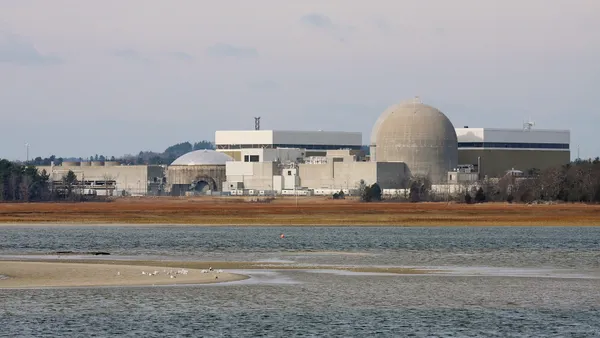Dive Brief:
- A $3.5 billion pipeline project in the Southeast will continue with construction at least temporarily after a federal court on Wednesday failed to issue a mandate that would have shut down its operation.
- Last week, the U.S. Court of Appeals for the District of Columbia Circuit reiterated an August ruling that threw out the environmental analysis conducted by the Federal Energy Regulatory Commission for the project. The court was expected to issue the formal mandate on that decision Wednesday, which would have halted the project.
- FERC and pipeline owners, however, filed for a last-minute delay of the mandate, which E&E News reports could give the project a few weeks of breathing room while judges consider the arguments. FERC also issued a final environmental analysis of the pipeline this week that it says complies with the court's order to take climate impacts into account.
Dive Insight:
The D.C. Circuit's failure to issue a formal mandate Wednesday is the latest installment in a series of legal battles over the Southeast Market Pipelines Project and how FERC accounts for climate change in its infrastructure decisions.
Last August, the D.C. Circuit rejected FERC's approach to evaluating the climate impacts of the pipelines, writing it should have given a "quantitative estimate" of the greenhouse gas effects, or explain better why it cannot. Last Wednesday, the court affirmed that ruling, refusing to review the decision after a challenge from pipeline backers.
That decision could have put the SMP project and its 515-mile Sabal Trail pipeline on hold when the court issued its formal mandate on the decision, typically a week after it is announced. But Wednesday came and went this week with no word from the court.
E&E reports that may be because judges need time to consider some last-minute filings in the case. Late Tuesday, FERC and pipeline owners made last minute requests to delay the issuance of the formal mandate. FERC asked the court to put the case on hold for 45 days while it readies an order that would reinstate construction permits for Sabal Trail and the associated pipelines, arguing that shutting it down could threaten fuel supply to gas plants in Florida.
"Immediate vacatur would revoke the certificates of public convenience and necessity for the projects at issue —pipelines that are currently providing natural gas to power plants in Florida," FERC wrote. "Without such certificates, the pipelines would have to cease operating, at least temporarily."
FERC argues that it can reinstate the construction permits because it has taken steps to comply with the D.C. Circuit's directives on climate analysis. On Monday, FERC issued the final supplemental environmental impact statement (SEIS) for the Southeast Market project, writing that it cannot judge whether the climate impacts of the project will be significant or not.
"[W]e have not identified any research that identifies a project level significance threshold of GHG emissions for climate change," FERC wrote in the SEIS. "Without some specific definition, or basis in physical science, it would be inappropriate to ascribe significance to a rate or volume of GHG emissions."
Environmentalists are likely to challenge that analysis. The Sierra Club, which brought the original suit against the project, on Monday called on FERC to wait at least 30 days after publishing the environmental analysis to issue any new certificates. It and other groups have already filed with FERC asking it to reject requests for new construction certificates and will likely file suit again to challenge the agency's conclusion that climate impacts cannot be determined.
"We know where the gas is going, and we know the current and future proposed power plants that it could feed," Kelly Martin, director of the Sierra Club's Beyond Dirty Fuels campaign, told Utility Dive Monday. "It is pretty standard to be able to account for the climate impacts from a power plant."













